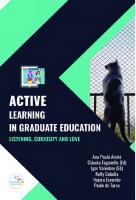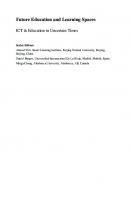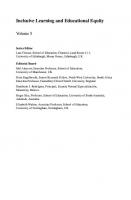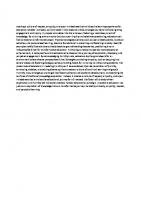Fostering Passionate Learning Through Humility and Curiosity Embracing Perspectives in Education
116 102 474KB
English Pages [3] Year 2023
Recommend Papers
File loading please wait...
Citation preview
Research article Fostering Passionate Learning Through Humility and Curiosity: Embracing Perspectives in Education
Dr zeroual khalid
Encouraging humility and curiosity among students can be a powerful catalyst for fostering a genuine passion for learning and an openness to diverse perspectives. When students approach learning with humility, they acknowledge that they don't have all the answers and remain open to new information and ideas. This mindset creates a fertile ground for curiosity, prompting them to ask questions, explore different viewpoints, and engage more deeply with the subject matter. Moreover, humility helps students recognize the value in others' perspectives, leading to a greater willingness to listen and learn from diverse viewpoints. This openness can enrich their understanding, encouraging empathy and respect for differing opinions. By cultivating these qualities in educational settings, educators can empower students to embrace a lifelong love for learning and develop the crucial skill of considering various viewpoints, essential in an increasingly interconnected and diverse world. Curiosity serves as a potent catalyst in fostering engagement and learning. It acts as a catalyst, propelling us into exploration and inquiry. When we examine its core, it becomes evident how curiosity propels us to seek answers, challenge the unknown, and delve deeper into knowledge. Creating an environment that celebrates questioning encourages students to embrace exploration and discovery in their learning journey. It's about nurturing a space where curiosity thrives and becomes the driving force behind acquiring knowledge. To ignite and sustain curiosity in the classroom, practical strategies are key. Encourage open-ended questions, hands-on activities, and project-based learning that allow students to investigate and find their own answers. Incorporate surprise elements, intriguing stories, or puzzles that pique their interest. Also, personalize learning experiences to cater to different interests and learning styles, fostering a sense of ownership in their learning journey. Real-life examples are fantastic for showcasing the power of curiosity in action. Think about scientists making groundbreaking discoveries due to their insatiable curiosity or historical figures driven by a desire to explore the unknown. Similarly, anecdotes from your classroom or stories of students who thrived due to their curiosity-driven learning can be incredibly impactful. Ultimately, fostering curiosity isn't just about adding another element to education; it's about transforming the entire approach to learning. Defining humility in the realm of education involves acknowledging its role in fostering an inclusive and open-minded learning environment. It's about recognizing that humility allows for a sense of openness, creating space for diverse perspectives and ideas to flourish. When educators embody humility, they set the stage for a respectful and inclusive atmosphere where everyone's voice is valued. Promoting empathy and understanding is a key strategy in cultivating humility among students. Educators can incorporate activities that encourage students to step into others' shoes, fostering empathy and appreciation for diverse viewpoints. It involves creating opportunities for dialogue, active listening, and perspective-taking exercises that broaden students' understanding of different backgrounds and experiences. The significance of teachers modeling humility cannot be overstated. When educators display humility by admitting mistakes, being open to learning from others, and valuing diverse opinions, they set a powerful example for students. This modeling cultivates a culture of continuous learning and growth, showing that humility isn't a weakness but a strength that fuels personal and academic development. In essence, humility in education goes beyond just knowledge acquisition. It's about
creating a culture of respect, empathy, and open-mindedness that enriches the learning experience for everyone involved. Curiosity, as illuminated in this research article, emerges as a dynamic force igniting engagement and inquiry. It propels us to delve into the unknown, fostering a relentless pursuit of knowledge. By nurturing environments that champion inquiry and celebrate questioning, educators can fuel curiosity's transformative power. Practical strategies outlined, such as open-ended queries, hands-on activities, and personalised learning, become foundational in sustaining and fostering curiosity. Real-life examples vividly illustrate how curiosity leads to groundbreaking discoveries, positioning it as an indispensable driver for transformative education. Embracing curiosity transcends mere educational enhancement; it reshapes the entire educational landscape into a journey of exploration, discovery, and perpetual engagement. By acknowledging humility's role, educators lay the groundwork for an environment where diverse perspectives thrive. Strategies promoting empathy, such as stepping into others' shoes and fostering dialogue, serve as building blocks for nurturing humility among students. The pivotal role of educators in modeling humility can't be overstated; their demonstration of humility, embracing mistakes, and valuing diverse opinions creates a culture of continual learning and growth. Humility, thus, emerges as a strength that fosters personal and academic development, transcending the confines of traditional knowledge acquisition. Instead, it creates a culture of respect, empathy, and openmindedness that enriches the educational journey for all involved. the fusion of curiosity-driven exploration and humility-led inclusivity creates a holistic educational paradigm. It positions education not just as an acquisition of knowledge but as a transformative journey marked by curiosity, empathy, respect, and perpetual learning.





![Strategies for Fostering Inclusive Classrooms in Higher Education : International Perspectives on Equity and Inclusion [1 ed.]
9781787560628, 9781787560611](https://ebin.pub/img/200x200/strategies-for-fostering-inclusive-classrooms-in-higher-education-international-perspectives-on-equity-and-inclusion-1nbsped-9781787560628-9781787560611.jpg)




